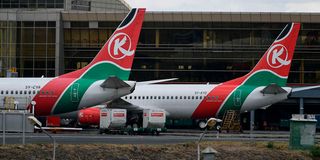Premium
Airport fuel glitch disrupts Kenya Airways, Jambojet schedules

Kenya Airways planes at the Jomo Kenyatta International Airport (JKIA) parking bay.
Several flights at Jomo Kenyatta International Airport (JKIA) were delayed on Thursday morning following an alleged fuel-supply hitch, amid claims of jet fuel shortage.
Both Kenya Airways (KQ) and Jambojet issued statements, announcing the disruption of local and international flights to their clients.
In a statement, KQ said the delay was caused by maintenance of fuel hydrants that extended beyond the planned time.
“Our dedicated teams are working tirelessly to recover our departure and arrival schedule by midday today, and we appreciate your understanding and patience during this time,” the national carrier said.
Jambojet, on the other hand, said it was forced to cancel several flights to Mombasa from JKIA following the fuel hitch
An airline representative told Nation.Africa that all Mombasa-bound flights had been affected.
“All our morning departures out of JKIA were affected. Flights from Mombasa hub are on schedule,” the representative said.
Confirming the hitch, the Kenya Airports Authority (KAA) said that the fuel supply disruption impacted airport operations, but the issue had been resolved.
“Our fuel supplier has resolved the issue and we are now refuelling and ready for boarding,” Jambojet added.
The KAA statement came amid claims that JKIA had been hit by fuel shortage due to pending bills.
Kisii Senator Richard Onyonka took to social media and said that there was a global alert indicating a fuel shortage at the airport.
Mr Onyonka questioned why JKIA was experiencing such shortages yet the Kenyan government is engaged in a government-to-government (G to G) oil agreement.
“There is a global alert that there is no fuel at JKIA. Is this a result of us not being able to pay our fuel debts, and yet we are in a G-to-G arrangement that is to stabilise the macroeconomic environment by providing an extended credit period for petroleum imports,” he said.
Jet fuel is normally supplied by various licensed companies at airport facilities.
In 2019, airlines operating out of Nairobi's JKIA were forced to divert to regional airports for refuelling as stocks of the commodity neared depletion.
The fuel shortage was blamed on inadequate orders by oil marketing companies that sold directly to airlines.
The shortage at the time subjected airlines to expensive jet fuel in other airports where they were forced to pay more for the commodity.
The situation was normalised after a vessel carrying 115 million litres of jet fuel docked at the Port of Mombasa and started discharging fuel.
The amount of jet fuel purchased by Kenyan airlines increased last year, signalling an increase in air travel by local and international travellers.
According to official data from the Kenya National Bureau of Statistics
(KNBS), airlines purchased 661,100 tonnes of fuel in 2023, an 11 per cent increase from the previous year.
This is the highest increase in jet fuel consumption since COVID-19, indicating improved performance in the aviation sector.
The latest setback comes days after KQ said this week that it lost at least Sh80 million during the recent demonstrations against the government's deal with Adani Company to take over JKIA.
The airline's Chief Executive Officer (CEO) Allan Kilavuka revealed on Monday that the flight disruptions experienced during the strike resulted in the airline suffering huge losses.
He said the airline was forced to pay compensation as well as deal with
rebooking of travellers as some flights were delayed as a result of the strike.
“Strikes are very bad for us. If you look at the cost in terms of time, rebooking, paying compensation, we estimated at least Sh80 million for that one day of disruption,” he said.
On September 11, thousands of passengers were left stranded after aviation workers at three major airports downed tools over the government’s plan to lease the airport to the Indian Based Company Adani.
The striking union members expressed concern about job losses if the Adani Group takes over the operation of JKIA.
However, the government recently clarified that its agreement with Adani will only cover the aviation and commercial development of JKIA.
Appearing before the Senate Roads, Housing and Transport Committee, Transport and Roads Cabinet Secretary Davis Chirchir assured that the Adani Privately Initiated Proposal (PIP), which is yet to be finalised, will not affect other airports and airstrips around the country, but only the National Major Asset.




